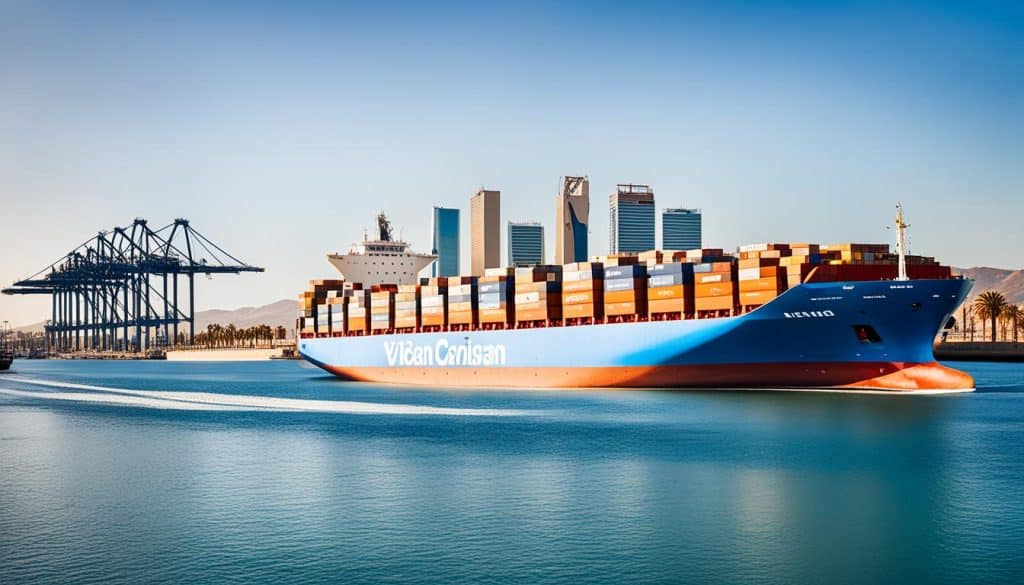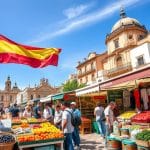Welcome to our guide on navigating the logistics in Spain! If you are an expat or a business ready to grow in the Spanish market, understanding the local logistics is key. We will share valuable insights and tips to help you succeed in Spain’s logistics landscape.
Spain is known for its lively culture, beautiful views, and deep history. It’s a unique place for logistics. From Barcelona’s busy streets to Andalusia’s sunny coasts, Spain offers opportunities and challenges. We’ll discuss culture shock, everyday life, making friends, and living in Spain, so you can feel confident in this diverse market.
Key Takeaways:
- Understanding Spain’s logistics is vital for expats and businesses in the Spanish market.
- Culture shock is common, but getting to know local customs and the language can help.
- Handling everyday life involves proper documents, managing finances, and getting insurance.
- Creating connections through social events and supporting local shops helps build community.
- Spain’s logistics sector is varied, supporting important areas like tourism, manufacturing, and green energy.
Culture Shock in Spain
Living in Spain brings excitement and adventure for expats. But, you’ll face cultural differences. Understanding them will enrich your stay.
Social Norms and Customs
Spain’s social life is distinct. Family, community, and social gatherings are valued. Parks, plazas, and cafes often buzz with friends.
Leisure is significant in Spain. Spaniards take long lunch breaks and may enjoy siestas. Getting used to this can be challenging but worth it.
The concept of “mañana” means a relaxed attitude towards time. It’s lovely but requires patience, especially if you value punctuality.
Language and Communication
Language plays a big role in adjusting to Spain. Many speak English, yet speaking Spanish helps in making deeper connections.
Learning Spanish opens many doors. Consider language classes or exchange programs. Don’t be shy; speaking with locals is appreciated and helpful.
Gastronomy and Daily Life
Food is central in Spanish culture. Mealtimes are for sharing. The main meal is at midday, with a lighter dinner.
Don’t miss out on local markets and traditional dishes. Trying new foods—from paella to churros—is exciting!
The Spanish Pace of Life
Spain offers a slower pace of life. Valuing leisure and family time is refreshing. It might demand adjusting if you’re from a fast-paced environment.
Enjoy life’s small moments. Take leisurely strolls, enjoy siestas, or spend evenings with friends. This enhances your experience.
Here are some tips to adjust smoothly:
- Learn basic Spanish and practice with locals
- Dive into the local food scene with traditional dishes
- Appreciate the slower pace and cherish each moment
- Join in local traditions and celebrations
- Make efforts to socialize and meet locals
Having an open mind towards cultural differences enriches your expat journey in Spain.
Cultural Differences between Spain and Other Countries
| Aspect | Spain | Other Countries |
|---|---|---|
| Meal Times | Large midday meal, lighter dinner | Smaller meals throughout the day |
| Punctuality | Relaxed attitude towards time | Valued punctuality |
| Siesta | Midday break for rest | No midday break |
| Community | Strong sense of community and socializing | More individualistic |
| Language | Spanish | English, French, German, etc. depending on the country |
Navigating Everyday Life in Spain
Living in Spain is a great adventure. But, you need to be ready for its challenges. It’s key to consider a few things for a smooth start.
1. Getting Your Paperwork in Order
Moving to Spain means sorting out your paperwork first. You’ll need the right visas and permits to live and work here. Getting your documents right saves you trouble and lets you enjoy Spain fully.
2. Opening a Spanish Bank Account
A Spanish bank account makes daily life easier. It helps with paying bills, setting up payments, and handling your money. Local shops often prefer it too. So, it’s essential for a smoother life in Spain.
3. Considering Insurance
Insurance is crucial in Spain to protect you and your stuff. You must have health and home insurance by law. It keeps you secure and ready for any surprise.
| Types of Insurance | What it covers | Key Benefits |
|---|---|---|
| Health Insurance | Medical costs, hospital stays, and drugs | Good health care in Spain, peace of mind |
| Home Insurance | Protects building and contents, liability insurance | Protects your money if there’s damage or theft, covers legal stuff |
| Vehicle Insurance | Covers accidents, theft, and damage | You follow the law, protects your money in accidents |
Handling these practical things means expats can enjoy Spain better. This advice keeps you legal and makes your time in Spain better and more fun.
Making Connections in Spain
Building a community is key to thriving in a new country. Expats in Spain have many chances to socialize and connect with both locals and other expatriates.
One great way to meet others is by joining expat groups. These groups hold social events, outings, and networking chances. They offer a supportive space where expats can share stories, give advice, and form strong friendships.
Taking classes is another top way to connect and dive into Spanish culture. Whether it’s learning the language, cooking, or dancing, you’ll gain new skills and meet people with similar interests.
Volunteering offers a chance to contribute to the community and connect. Spain has many volunteer organizations that cater to various causes. By volunteering, you not only help out but also meet people who care about the same things you do.
Supporting local businesses also builds connections in the community. By shopping at markets, visiting local cafes, and attending events, you can engage with locals and show your support.
Benefits of Making Connections:
- Create a support system of friends and acquaintances
- Exchange cultural insights and experiences
- Expand personal and professional networks
- Discover hidden gems and local recommendations
- Feel more integrated and less isolated in a new country
Tips for Making Meaningful Connections:
- Be open-minded and receptive to new experiences
- Show genuine interest in others and listen to their stories
- Take part in community events and celebrations
- Learn basic Spanish phrases to communicate better
- Embrace cultural differences and respect local customs
| Activity | Description | Location |
|---|---|---|
| Language Exchange Meetups | Connect with locals and language learners to practice your Spanish skills | Various cities across Spain |
| International Women’s Associations | Join women’s associations that host events and activities for female expats | Madrid, Barcelona, Valencia |
| Volunteer Organizations | Engage in community service and meet like-minded individuals | Nationwide |
| Local Markets and Festivals | Explore the vibrant local culture while supporting small businesses | Various towns and cities |
The Logistics of Moving to Spain
Moving to a new country is exciting but comes with challenges. If you’re moving to Spain, you need to be ready and informed. This will help you settle in smoothly.
Understanding how to move to Spain is important. Let’s look at the main things to think about:
Shipping Belongings
Planning is key when moving your things to Spain. Look for trusted international shippers who know about Spain. They’ll help with packing, shipping, and customs, making sure everything arrives safely.
Finding Accommodation
It’s vital to find the right place to live. Start looking early, whether you want to rent or buy. Think about your budget, where you want to live, and what’s nearby. Real estate agents and online sites are great for finding a home in Spain.
Arranging Transportation
It’s important to sort out how you’ll get around in Spain. Cities have good public transport like trains and buses. If you want to go your own way, think about renting or buying a car. Make sure you have the right license and insurance to drive there.
Professional Assistance
Getting help from professionals can make moving easier. Relocation services for expats offer lots of support. They can help with paperwork, visas, and give tips about local life. Their help can smooth out your move.
Knowing what’s involved in moving to Spain and being prepared is key. Get ready for your move and enjoy starting a new chapter in Spain!
Key Industries in Spain
In Spain, several key industries boost the nation’s economy. They are crucial for creating jobs, sparking innovation, and fostering economic growth. Among Spain’s vital sectors are:
- Tourism: Spain shines with its lively tourism. Its stunning beaches, rich culture, and top-tier attractions draw visitors worldwide.
- Manufacturing: Spain’s manufacturing is broad and includes automotive, textile, and food processing. These industries play a big part in the country’s GDP.
- Agriculture: The country’s agriculture is varied, producing fruits, vegetables, olives, and cereals. Spain is a top agricultural exporter in Europe.
- Logistics: A key to the economy, logistics moves goods inside and outside Spain. Its prime location and strong infrastructure make it a major logistics centre in Europe.
- Renewable Energy: Spain invests heavily in renewable sources like wind and solar power. It leads in renewable energy, focusing on cutting carbon emissions and pushing for sustainable solutions.
These industries are pillars in Spain’s economic development, offering chances for local and global businesses. By leveraging these sectors’ strengths, Spain keeps drawing investments and fostering innovation.
Transportation and Infrastructure in Spain
Spain has a top-notch transport system that helps move people and goods around. It has lots of highways, railways, and airports. This makes Spain an important place for travel inside the country and to other countries.
Spain’s roads link big cities, towns, and regions together. The motorways are well-kept, making trips easy for locals and tourists. There are also many smaller roads. These get you to the less-visited places.
Trains are a big deal in Spain. The country’s trains are reliable and fast. They connect big cities with both speedy and local services. The fast AVE trains by Renfe zip you between places like Madrid, Barcelona, and Seville.
Spain is great for flying too. It has lots of international airports for flying in and out. The busiest ones are in Madrid, Barcelona, and Palma de Mallorca. They offer many flights worldwide.
Spain’s ports are also key for business. The Barcelona Port is one of Europe’s busiest. It’s a main entry for goods from Asia. The Valencia Port is crucial too, dealing with loads of containers.
In short, Spain’s transport and infrastructure are top tier. It offers lots of choices for travel, both within Spain and internationally. Its roads, trains, airports, and ports are key for worldwide business and travel.
Customs and Regulations in Spain
It’s vital to know Spain’s customs and rules for those in logistics. Being a part of the EU, Spain follows EU laws on imports, exports, and customs. Learning these rules and specific needs for certain sectors is key for a smooth workflow.
Import and Export Regulations
There are many rules for trading goods with Spain. You must handle paperwork, customs duties, and match product standards. Make sure you have all documents ready, like invoices, packing lists, and origin certificates. Also, know the customs value, tariff codes, and VAT to avoid issues.
Customs Procedures
Customs processes are crucial for easy trade across borders. In Spain, customs checks both incoming and outgoing goods. This includes inspections and paying duties and taxes. Partnering with skilled customs agents or logistics providers can prevent hold-ups, fines, and extra costs.
Industry-Specific Regulations
Different sectors in Spain must follow specific rules which impact logistics. For instance, the pharma sector has strict rules for shipping and storing medicines and equipment. Food and flowers need the right temperature and cleanliness standards. Knowing these rules is crucial for compliance and keeping goods in perfect condition.
| Industry | Regulation |
|---|---|
| Pharmaceutical | Transportation and storage guidelines for drugs and medical equipment |
| Perishable Goods | Adherence to temperature-controlled environments and sanitary standards |
| Chemical | Compliance with safety regulations for hazardous materials |
| Textile | Labeling requirements and compliance with textile standards |
Key Customs Documents
For trading in Spain, you need several key customs documents. These documents are crucial for clearing customs and giving information to the authorities. The important documents include:
- Commercial invoice
- Packing list
- Bill of lading or airway bill
- Certificate of origin
- Customs declaration
- Insurance certificate
Getting these documents right is crucial to avoid delays or fines at customs.
Technology and Innovation in the Spanish Logistics Sector
Spain’s logistics sector leads with new technologies, making operations better and meeting industry needs. Spain, a global logistics hub, benefits greatly from tech. It boosts efficiency, makes processes smoother, and improves customer service.
Advanced Tracking Systems
Advanced tracking systems are changing Spain’s logistics game. They use GPS and RFID to track shipments in real time. This means better inventory management, optimized routes, and timely delivery.
Automation and Robotics
In Spain, automation and robotics are upgrading warehouses. Systems sort items and robots help in moving goods, cutting down on manual work and errors. Robots, like AGVs, also help in picking and packing items quickly and accurately.
Data Analytics and Artificial Intelligence
Data analytics and AI are improving decision-making and efficiency. By analyzing data, companies spot trends in customer behavior and supply chain. AI helps in planning routes, managing loads, and using resources better, cutting costs.
Internet of Things (IoT)
The IoT is key in Spain by linking devices in the supply chain. Sensors in vehicles and warehouses monitor conditions like temperature and humidity. This allows for better maintenance, ensures product quality, and increases visibility.
Technological Advancements in the Spanish Logistics Sector
| Technology | Application |
|---|---|
| Advanced Tracking Systems | Real-time visibility and traceability of shipments |
| Automation and Robotics | Streamlined warehouse operations and minimized manual labor |
| Data Analytics and Artificial Intelligence | Informed decision-making and optimized supply chain performance |
| Internet of Things (IoT) | Improved monitoring, product integrity, and supply chain visibility |
Technology and innovation are helping Spanish logistics companies tackle challenges and boost efficiency. They are enhancing the customer experience. By adopting these technologies, Spain’s logistics is set to grow and boost the economy.
Sustainability in the Spanish Logistics Industry
In recent years, the Spanish logistics industry made sustainability a key goal. The nation actively works to cut carbon emissions, use green transport, and improve supply chains for less environmental harm. These steps help the planet and the industry’s future.
Electric vehicles (EVs) are becoming crucial for logistics. By using EVs, companies cut down on carbon and clean the air. The Spanish government helps by offering incentives for using electric vehicles in logistics.
The industry is also turning to green packaging. Sustainable materials like biodegradable and recyclable options are more popular. This approach cuts waste and supports a circular economy.
Efficient route planning
Planning efficient routes is vital for green logistics in Spain. By choosing the best routes, companies lower fuel use and emissions. They use new route planning tech and GPS to find eco-friendly routes for shipping goods.
Technology has a big role in reaching sustainability goals. With automation and digital tools, operations get more efficient and less wasteful. For instance, automated warehouses make better use of space and save energy.
| Innovative Initiatives | Benefits |
|---|---|
| Use of electric vehicles | – Reduced carbon emissions – Lower operational costs (Less dependency on fuel) |
| Implementation of green packaging solutions | – Reduced waste – Promotes a circular economy |
| Efficient route planning | – Minimized fuel consumption – Lower greenhouse gas emissions |
| Automation and digitalization of processes | – Increased operational efficiency – Reduced waste and energy consumption |
The Spanish logistics sector is aiming for a greener, more efficient future. By using new tech, improving supply chains, and choosing eco-friendly options, Spanish companies show their care for the environment.
By focusing on green practices, logistics businesses align with global climate efforts and find new opportunities. Sustainable actions set companies apart, draw eco-aware customers, and help ensure a greener future for everyone.
Key Players in the Spanish Logistics Market
The logistics market in Spain is buzzing with competition. Many big companies lead the scene. They offer various services to help different industries.
Some top companies in Spain’s logistics sector are:
- DHL: A major global player, DHL shines in Spain. It provides international shipping, e-commerce solutions, and more, marking its territory in the Spanish market.
- DB Schenker: This company brings a wealth of logistics services to Spain. It’s known for air and ocean freight, alongside land and contract logistics, making a big impact.
- Kuehne + Nagel: With a solid base in Spain, Kuehne + Nagel excels in offering integrated logistics. Services include warehousing and distribution, customs, and more.
- Grupo Sesé: A leader in national and international logistics, especially for the automotive sector. Grupo Sesé delivers in vehicle transportation and warehousing, among other services.
- Carreras Group: This family-owned Spanish company is a logistics giant. It serves industries like retail and pharmaceuticals with its transportation and warehousing services.
These leaders have earned their spots through skill, trust, and a drive to please customers. Their big networks, savvy tech, and wide service range make them key allies for firms in Spain.
| Company | Services | Industry Focus |
|---|---|---|
| DHL | International shipping, supply chain management, e-commerce solutions | Various industries |
| DB Schenker | Air freight, ocean freight, land transportation, contract logistics | Various industries |
| Kuehne + Nagel | Warehousing, distribution, customs brokerage, project logistics | Various industries |
| Grupo Sesé | Vehicle transportation, warehousing, value-added services | Automotive |
| Carreras Group | Transportation, warehousing, distribution | Retail, pharmaceuticals, automotive |
Challenges and Opportunities in the Spanish Logistics Sector
Spain’s logistics sector faces both obstacles and chances for growth. The need for top-notch logistics services grows as Spain’s economy does. Yet, this expansion brings challenges that must be tackled for ongoing success.
Rising Fuel Costs
Rising fuel expenses are a big hurdle in Spain’s logistics field. Firms must get creative in handling their transport costs due to fluctuating fuel prices. Using vehicles that use less fuel and choosing the best delivery paths can lessen the sting of higher fuel prices. This boosts profits too.
Regulatory Changes
Logistics firms work within a regulatory setting that often changes. Keeping up with new rules can be both expensive and time-consuming. But, staying updated on changes and working with regulators can make navigating these changes smoother. This ensures they follow the rules.
Intensifying Competition
Competition is fierce in Spain’s logistics sector, with many trying to capture more market. To lead, firms must offer better services, efficient operations, and new ideas. Using tech, automation, and data analysis can set a company apart. This opens doors to new growth chances.
Opportunities for Expansion
Despite the hurdles, there are many chances to grow in the Spanish logistics sector. The boom in online shopping and higher demand for logistics services create a big market. By using technology, honing operations, and ensuring great service, businesses can lead in this growing field.
| Challenges | Opportunities |
|---|---|
| Increasing fuel costs | Growing demand for logistics services |
| Regulatory changes | Expanding e-commerce market |
| Intense competition | Potential for market differentiation |
Future Trends in the Spanish Logistics Industry
The logistics sector in Spain is changing fast. Future trends will greatly influence its growth. These trends are shaped by increased consumer demands, tech advances, and a focus on sustainability.
The Integration of Technology
Integrating more technology is a key trend for Spanish logistics. Companies are using things like blockchain and artificial intelligence to get better. These technologies help with tracking shipments in real time, making warehouses run on their own, and finding the best routes for transport. Thanks to Spain’s good telecom network and more people using digital tech, the logistics sector is ready to benefit from these advances.
The Rise of Sustainable Practices
The Spanish logistics field is focusing on being more green. As people worry more about climate change, companies are trying to cut down on harmful emissions. They’re using cleaner fuels and electric vehicles, making warehouses use less energy, and reducing waste across the supply chain. Spain’s push towards renewable energy and its goal to cut emissions to zero by 2050 fit well with these efforts. By going eco-friendly, the logistics sector can help make the future greener.
The Development of Last-Mile Delivery Solutions
Last-mile delivery is getting a lot of attention. With more people buying online, there’s a big need for better delivery options to the final destination. Spanish logistics are looking at new methods like drones, self-driving vehicles, and using regular people to deliver packages. These ideas could make deliveries quicker, cheaper, and more convenient for buyers. Making improvements in last-mile delivery is crucial for Spanish logistics to keep up with online shopping trends.
In summary, the future of Spanish logistics is about embracing tech, being more sustainable, and improving last-mile deliveries. These moves match changes in what consumers want and the industry’s environmental goals. As the Spanish logistics sector adapts, companies that follow these trends will likely succeed in a digital, eco-aware market.
| Future Trends | Impact on the Logistics Industry in Spain |
|---|---|
| The Integration of Technology | Streamlined operations, improved efficiency, and enhanced customer experience through real-time tracking, automation, and optimization. |
| The Rise of Sustainable Practices | Reduced carbon footprint, use of alternative fuels, and optimization of supply chain processes to minimize environmental impact. |
| The Development of Last-Mile Delivery Solutions | Faster and more convenient delivery options, optimized delivery routes, and improved customer satisfaction in the e-commerce era. |
Brexit’s Impact on the Logistics between Spain and the UK
Brexit changed how goods move between Spain and the UK. When the UK left the European Union on January 1st, 2021, customs and trade rules shifted. This has disrupted the flow of goods, making the logistics industry adapt.
Companies dealing with logistics now need to keep up with new rules. They must adjust how they work to fit into the post-Brexit world. Brexit’s effects on supply chains show in customs clearance, transport, and paperwork.
Customs Clearance
Customs procedures between Spain and the UK have seen big changes due to Brexit. Goods used to move freely as both countries were in the EU’s single market.
Now, moving goods between Spain and the UK requires customs documents and tariffs. Logistics companies have to get all paperwork right to avoid extra costs and delays.
Transport and Logistics Planning
Brexit has changed how goods are transported between Spain and the UK. New customs rules and possible border checks can slow things down.
Logistics firms must plan for these delays. They might need to change how they route goods and schedule deliveries to avoid impacting delivery times.
Regulatory Compliance
Regulation compliance is another area Brexit has impacted. Before, UK and Spanish companies followed the same EU rules.
Now, they must navigate different laws. Logistics firms must meet new safety, licensing, and certification requirements. Staying compliant is key to avoid legal problems.
| Impact | Explanation |
|---|---|
| Customs Procedures | The introduction of customs checks and tariffs, leading to changes in goods clearance and increased administrative requirements. |
| Transport Delays | Increased transit times due to potential border checks, particularly across the English Channel or the Bay of Biscay. |
| Regulatory Compliance | The need to comply with different regulatory frameworks and meet new safety and licensing requirements. |
Despite Brexit challenges, the Spain-UK logistics industry stays strong. The trade link remains solid. Companies are finding new ways to handle these issues.
Keeping updated on rules, working with reliable partners, and adapting are key. This way, businesses can keep goods moving smoothly between Spain and the UK.
The Future of Logistics in Spain
Spain is becoming a key player in the global logistics industry. Thanks to its strategic position, it is the gateway to Europe and Africa. Coupled with an expanding economy and a focus on innovation, Spain can meet future logistics needs.
The growth of international trade and e-commerce is pushing the logistics sector in Spain forward. As businesses go global and online shopping booms, the need for top-notch logistics services is increasing.
In today’s world, logistics are crucial for smooth international trade. Spain’s excellent transport infrastructure, including highways, railways, ports, and airports, supports its logistics sector.
Innovation and Technology
Innovation is key to Spain’s logistics future. Technologies like data analytics, blockchain, and automation are making logistics smoother and more efficient.
Case Study:
In 2021, Amazon revealed plans for a new fulfillment center in Seville, Spain. It will feature cutting-edge robotics and automation, showing how crucial technology is for e-commerce and logistics efficiency.
Spain is also home to groundbreaking startups changing the logistics game. They’re working on tracking solutions, improving last-mile delivery, and practicing sustainable logistics.
Sustainability and Green Initiatives
With environmental issues on the rise, logistics is turning green. Spain is keen on green initiatives and cutting carbon emissions.
Case Study:
Renewable energies like solar and wind are integrating into Spain’s logistics, lowering environmental impact and costs.
The adoption of electric vehicles and eco-friendly packaging is growing. These practices show Spain’s commitment to fighting climate change and boosting logistics efficiency.
The Importance of Collaboration
Collaboration is essential in the interconnected logistics industry. Spain values partnerships to enhance logistics and streamline supply chains.
Spain is promoting public-private partnerships and knowledge exchanges to tackle logistics challenges. By uniting experts, policymakers, and researchers, Spain is boosting talent, innovation, and industry growth.
The Role of Education and Training
The fast-evolving logistics sector demands skilled professionals. Investing in education and training is vital for Spain’s logistics future.
Spain is focusing on equipping people with the skills needed in logistics. This includes collaborations with educational bodies and industry leaders to provide practical training.
Key Factors Driving the Future of Logistics in Spain
| Factors | Description |
|---|---|
| Global Trade Expansion | The growth of international trade and e-commerce fuels the demand for efficient logistics services in Spain. |
| Innovation and Technology | Advancements in technology, such as automation and data analytics, enhance logistics operations and drive efficiency. |
| Sustainability and Green Initiatives | Spain’s commitment to sustainability drives the adoption of eco-friendly practices and renewable energy sources in logistics. |
| Collaboration and Partnerships | Collaboration between stakeholders fosters innovation, optimizes supply chains, and drives industry growth. |
| Education and Training | Investment in education and training programs equips individuals with the skills needed to meet industry demands. |
The future of logistics in Spain looks very promising. With its advantageous location, commitment to innovation and sustainability, focus on collaboration and education, Spain is set to enhance its logistics. The expanding global trade and e-commerce will further boost Spain’s role in the global logistics network.
Conclusion
Living in Spain as an expat can be both challenging and rewarding. You need to get used to the local culture and logistics. Making friends and keeping up with trends helps you understand the Spanish market better.
Spain’s logistics sector is growing fast. It has various industries, great infrastructure, and cares about being green. This means lots of chances for local and global businesses. Whether you want to start a business or find a job, Spain is a great place to grow.
Spain is known for its beautiful cities and landscapes. It offers a great life quality that draws people worldwide. By delving into the culture, learning Spanish, and adapting to local ways, Spain can truly become your home.
If you’re looking for adventure and success in a lively market, think about moving to Spain. It’s friendly, has a booming logistics scene, and offers countless opportunities. Spain has all you need for a successful expat experience.
FAQ
Q: What is culture shock and how does it affect expats in Spain?
Q: What are some tips for easing the transition and navigating everyday life in Spain?
Q: How can expats make connections and socialize in Spain?
Q: What are the logistics involved in moving to Spain as an expat?
Q: What are some key industries in Spain?
Q: What is the transportation and infrastructure system like in Spain?
Q: What are the customs and regulations involved in the Spanish logistics industry?
Q: How is technology and innovation influencing the Spanish logistics sector?
Q: What efforts are being made towards sustainability in the Spanish logistics industry?
Q: Who are some key players in the Spanish logistics market?
Q: What are the challenges and opportunities in the Spanish logistics sector?
Q: What future trends can we expect in the Spanish logistics industry?
Q: How has Brexit impacted the logistics between Spain and the UK?
Q: What does the future of logistics in Spain look like?
Source Links
- https://www.coface.com/news-economy-and-insights/events/webinar-navigating-the-current-state-of-the-transport-logistics-industry
- https://www.linkedin.com/pulse/navigating-logistics-landscape-deep-dive-world-load-ben-barnes-cclp-7lgbc
- https://quote.libertyexpatriates.es/en/living-spain-expat-guide-navigating-culture-language-and-daily-life














